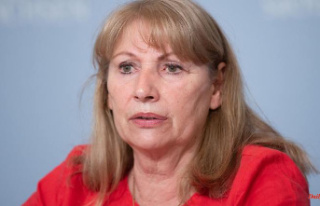According to a study, Germans generally appreciate their healthcare system. But in detail there is a lot of criticism and fears. In particular, the shortage of doctors is worrying doctors and citizens.
Wiesloch (dpa/lsw) - A shortage of doctors, long waiting times and services withheld for cost reasons are increasingly affecting people in Germany. Nevertheless, 81 percent of them continue to rate the healthcare system positively, according to a survey by the Allensbach Institute for Demoscopy for the 2022 Health Report of the Wiesloch-based financial service provider MLP (Rhein-Neckar-Kreis). According to this, 89 percent of the doctors themselves hold health care in high esteem.
According to the survey of more than 400 doctors and almost 1100 citizens, the shortage of doctors is particularly difficult for doctors and citizens. Every third citizen is aware of the increasing bottlenecks, in East Germany even more than every second. 52 percent of the resident doctors themselves also register a shortage of doctors, compared to 41 percent in 2019. The tense staff situation increases the burden on the remaining doctors. Almost three quarters of doctors in cities and regions with fewer than 100,000 inhabitants reported overtime, with family doctors being more affected than specialists.
At the same time, according to the study, the proportion of hospital doctors who would be eligible for a branch office increased to 46 percent (2019: 37 percent). But a change from the clinic to the practice would only shift the shortage. Because the problem of young people is also getting worse in the clinics. Currently, 57 percent of hospital doctors state that there is a doctor shortage in their own hospital, and almost a quarter fear it in the coming years.
The situation with specialist staff is similarly dramatic. According to the survey, more than every fifth practice is understaffed; a quarter have vacancies. There is also a shortage of nurses and other non-medical staff in hospitals: 89 percent of clinicians find it difficult or very difficult to fill a position. Nevertheless, 84 percent of physicians reject the entry of capital investors into the health care system; mainly because they fear that economic considerations might play too big a role.
According to their own statements, physicians can already no longer treat their patients from a purely therapeutic point of view. "Due to the cost pressure in the healthcare system, the majority of doctors see their freedom of therapy in question," says the report. In the population, 38 percent (2019: 34 percent) believe that they did not receive a specific treatment or medication for cost reasons. 60 percent of doctors and almost as many citizens see the health system on the way to two-tier medicine.
The view of the future is bleak for the population and the medical profession. Almost two thirds of the physicians surveyed assume that health care will deteriorate in the next ten years; in the population, the value is one third.
Most people don't expect much from the federal government: a third of the population gives poor marks for its health policy. Only 26 percent have a good impression, 41 percent do not give an opinion. The doctors were 28 percent satisfied, 39 percent not. Every third doctor, and thus significantly more than in the previous studies, did not want to evaluate health policy.
MLP CEO Uwe Schroeder-Wilberg called for serious future provision from the traffic light coalition. He summed it up: "This also includes an open-ended discussion on the expenditure side, i.e. on what the state health system should still be able to do in the future and how these services can be efficiently organized and provided."












